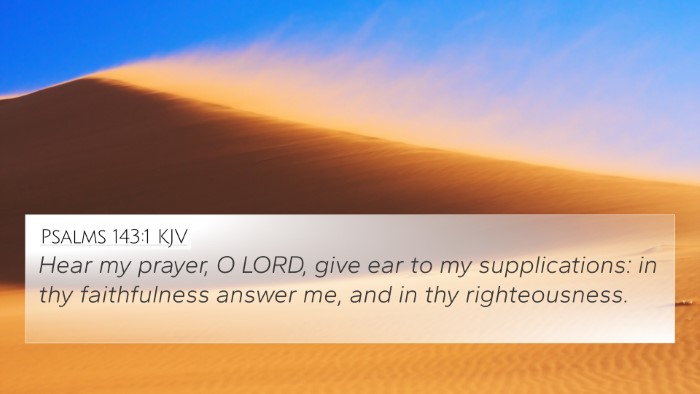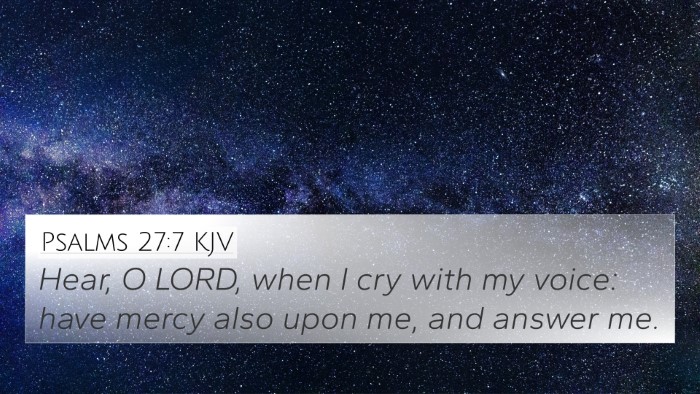Psalms 30:10 - Understanding the Verse
Psalms 30:10 says, "Hear, O LORD, and have mercy upon me: LORD, be thou my helper." This verse reflects a deep plea for divine intervention and support, characteristic of the psalmist's relationship with God.
Summary of Insights from Commentaries
The insights derived from renowned public domain commentaries such as those by Matthew Henry, Albert Barnes, and Adam Clarke provide a multifaceted understanding of the verse.
1. Matthew Henry's Commentary
Matthew Henry emphasizes the earnestness of the psalmist's request, pointing out that the need for mercy and assistance from God signifies a recognition of human vulnerability. He explains that the cry for help is an acknowledgement that true strength and support can only come from the Lord.
2. Albert Barnes' Commentary
Albert Barnes notes that this prayer not only highlights the psalmist's despair but also his faith in God’s power to save. He underscores the importance of calling upon God during times of trouble, illustrating that turning to God with a sincere heart can lead to divine mercy and support.
3. Adam Clarke's Commentary
Adam Clarke further elaborates on the intimate relationship between the believer and God, suggesting that such cries for help are indicative of a profound faith. He interprets the plea as an invitation for reflection on the grace that follows the plea for mercy, indicating that God answers those who earnestly seek Him.
Connections and Cross-References
To gain a deeper understanding of Psalms 30:10, one can explore its connections with other Bible verses. Here are some relevant cross-references:
- Psalm 34:17 - "The righteous cry, and the LORD heareth, and delivereth them out of all their troubles."
- Psalm 86:3 - "Be merciful unto me, O Lord: for I cry unto thee daily."
- Hebrews 4:16 - "Let us therefore come boldly unto the throne of grace, that we may obtain mercy, and find grace to help in time of need."
- James 5:16 - "Confess your faults one to another, and pray one for another, that ye may be healed. The effectual fervent prayer of a righteous man availeth much."
- Isaiah 41:10 - "Fear thou not; for I am with thee: be not dismayed; for I am thy God: I will strengthen thee; yea, I will help thee; yea, I will uphold thee with the right hand of my righteousness."
- John 14:14 - "If ye shall ask any thing in my name, I will do it."
- Psalm 121:1-2 - "I will lift up mine eyes unto the hills, from whence cometh my help. My help cometh from the LORD, which made heaven and earth."
Thematic Connections
The themes of mercy, divine assistance, and the human condition interweave through Psalms 30:10 and its cross-references, reinforcing the notion that God's help is readily available to those who call upon Him in sincerity and faith.
Conclusion
Psalms 30:10 encapsulates a profound human yearning for divine support and mercy. The psalmist's appeal to the Lord epitomizes not only despair but also a rich faith that recognizes the imperativeness of God's aid. By exploring related verses through tools for Bible cross-referencing, believers can find reassurance in the consistency of God's promises throughout scripture.
SEO Content for Bible Cross-Referencing
Understanding how to find cross-references in the Bible can enrich one’s study and appreciation of the text. By identifying connections between Old and New Testament verses or performing a comparative study of Pauline epistles, readers can uncover the inter-Biblical dialogue that strengthens theological themes present across scriptures. This knowledge is essential for Bible verse analysis, and utilizing a Bible concordance or cross-reference guide can greatly enhance Bible study efforts.
In summary, Psalms 30:10 serves as a reminder of the necessity of seeking God’s mercy and assistance. Whether cited in personal prayer, reflection, or sermon preparation, this verse maintains its relevance as a guiding principle for those exploring the depths of faith and divine support.








